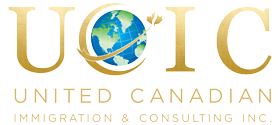WORK IN CANADA
Temporary foreign workers have been an important feature of Canada’s labour market for decades. Nearly 300,000 foreign workers come to Canada to work each year. There are many ways to work in Canada.
If you are interested in working in Canada or you already have a job offer from a Canadian employer, you should understand all your options and choose the program that best fits your situation.
Canada operates the Temporary Foreign Worker Program (TFWP) and the International Mobility Program (IMP). Under the TFWP, a Labour Market Impact Assessment (LMIA) is required for a foreign national to obtain a work permit. Additionally, under the IMP an LMIA is not required for a foreign national to obtain a work permit. The IMP is designed to help improve Canada’s economic, social and cultural development.
Key differences between each program below:
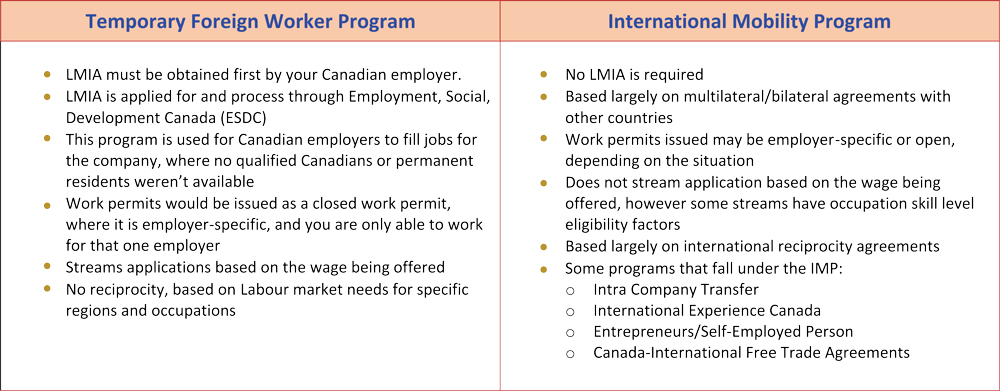
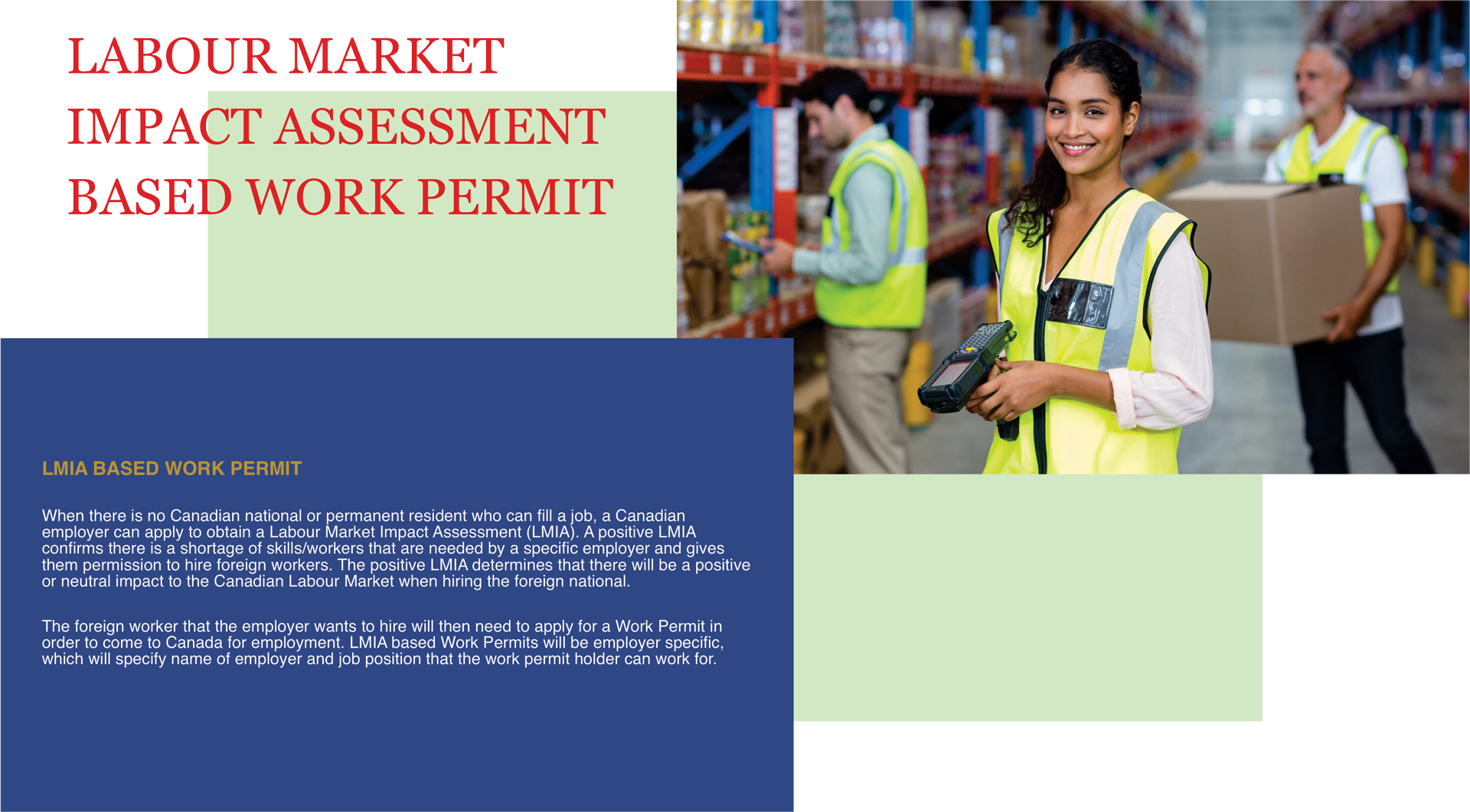
General steps a foreign national must take to obtain a LMIA based work permit:
- Your employer applies to Employment Social Development Canada (ESDC) for a positive LMIA.
- Your employer would provide you a copy of the positive LMIA, along with a detailed job offer.
- You apply for your temporary work permit with IRCC. Depending on your country of citizenship, you may be required to obtain a temporary resident visa (TRV) to travel to Canada. Therefore, you would be required to apply for your temporary work permit application to the designated Canadian visa office abroad.
- Provide proof to IRCC that you meet the requirements of the job offer and satisfy other eligibility requirements for temporary residence status in Canada
- Once your TRV is issued (if applicable to you), then upon your arrival in Canada, at the port of entry, a Canadian Border Services Officer will issue your Canadian temporary work permit.
Most Canadian work permits are employer specific, also known as closed work permits. They are granted for a specific employer and job position in Canada. If a foreign worker finds a new employment with a new employer, the foreign worker must apply for and receive a new work permit for that new employer before he or she can commence to work for their employer or in their new position.
If you would like more information about obtaining a LMIA based work permit, contact our office.
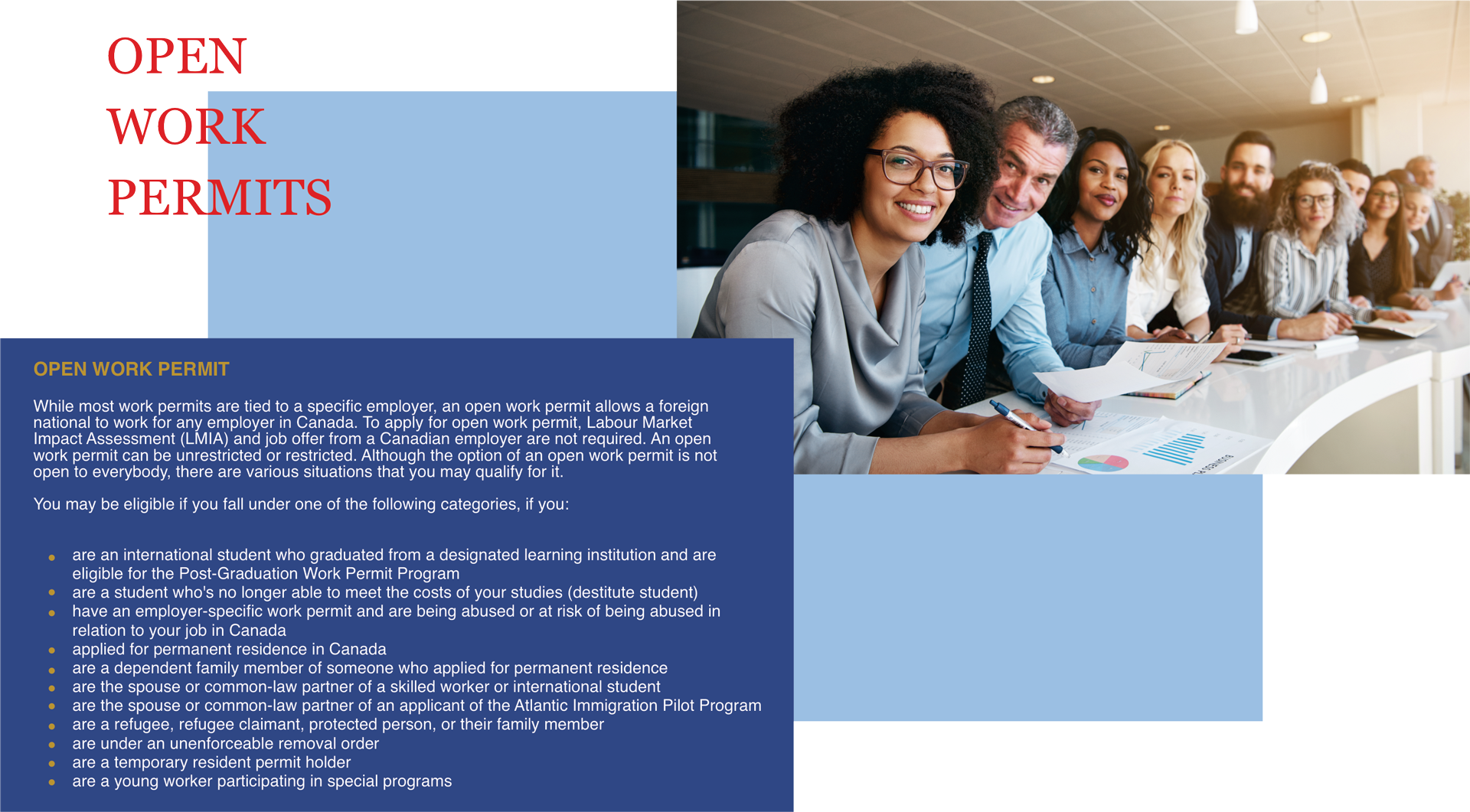
Some of the most common streams that people can qualify for an open work permit are listed below. The eligibility requirements and application procedure differ depending on the specific situation of each candidate. The following are examples of common programs that can make one eligible for an open work permit.
Permanent residence applicants residing in Canada – Bridging Open Work Permit
You and your spouse or common-law partner may be eligible for a Bridging Open Work Permit if you reside in Canada and have applied for permanent residence through one of the federal or provincial economic class programs. If you are working legally in Canada and have submitted your application under one of the following economic immigration programs, you can apply for the open work permit, known as the bridging open work permit (BOWP).
- Federal Skilled Worker Program
- Canadian Experience Class
- Federal Skilled Trades Program
- Provincial Nominee Program
- Agri-Food Pilot Program
- Home Child-Care Provider Pilot or Home Support Worker Pilot
To be eligible to apply for BOWP, the following criteria must be met:
- You are currently in Canada, and you have a valid work permit status that is expiring within 4 months.
- You are the principal applicant of the permanent residence application submitted in one of the above-mentioned streams
- You have received a positive eligibility assessment for your application from IRCC
The spouse of the principal applicant can also apply for an open work permit, if they are able to meet the criteria for an open work permit based on which program the permanent residence application was submitted under.
Spouses or common-law partners being sponsored under Inland Sponsorship
Spouses and common-law partners of Canadians or Permanent Residents may be granted an open work permit if they are being sponsored for permanent residence under the spouse or common-law partner in Canada Class Sponsorship (inland sponsorship) and meets all eligibility requirements under this program.
To qualify for an open work permit under this stream, certain criteria must be met:
- Your permanent residence application must be submitted under the Spouse or Common-law Partnership in Canada Sponsorship Program
- You must be residing at in Canada and at the same address as your spouse or common-law partner
- Both you and your spouse must meet all the eligibility requirements under the Spouse or Common-law Partnership in Canada Sponsorship Program
- You must also have valid temporary resident status in Canada, as a worker, student, or visitor
Spouses or common law partners of temporary foreign workers
You may be eligible for an open work permit if you are the spouse or common law partner of temporary foreign worker who has employment in Canada in a job and is employed in a position under Skill Level 0, A or B of the National Occupational Classification (NOC) for a period of 6 months or more.
Spouses or common-law partners of international students
To be eligible for an open work permit as a spouse or common-law partner of an international student, your spouse or common-law partner must have a valid study permit and be a full-time student at one of these types of schools:
- a public post-secondary school, such as a college or university, or CEGEP in Quebec
- a private college-level school in Quebec
- a Canadian private school that can legally award degrees under provincial law (for example, Bachelors, Masters or Doctorate degree)
International Graduates and their spouses and common law partners
To be eligible for an open work permit, students who have graduated from a designated learning institution (DLI) and an eligible program in Canada must meet the requirements under the Post-Graduation Work Permit Program (PGWP). To be eligible for a PGWP, a foreign national must have studied full-time in Canada in a program of at least 8 months at a DLI.
You may also be eligible for an open work permit if you are the spouse and common-law partner of a post-graduation work permit holder. These open work permits will generally be issued a validity date that would corresponds to the period during which your spouse or common-law partner would be authorized to work in Canada.
International Experience Canada Participants
Citizens of countries who are participating in the International Experience Canada (IEC) program may also be able to obtain an open work permit under the Working Holiday category. IEC is open to young adults who are citizens of foreign countries which have reciprocal agreements with Canada. The eligible age range will differ from each participating country but is usually between 18 and 35 years old.
To get more information on whether you can qualify for an open work permit, contact our office.
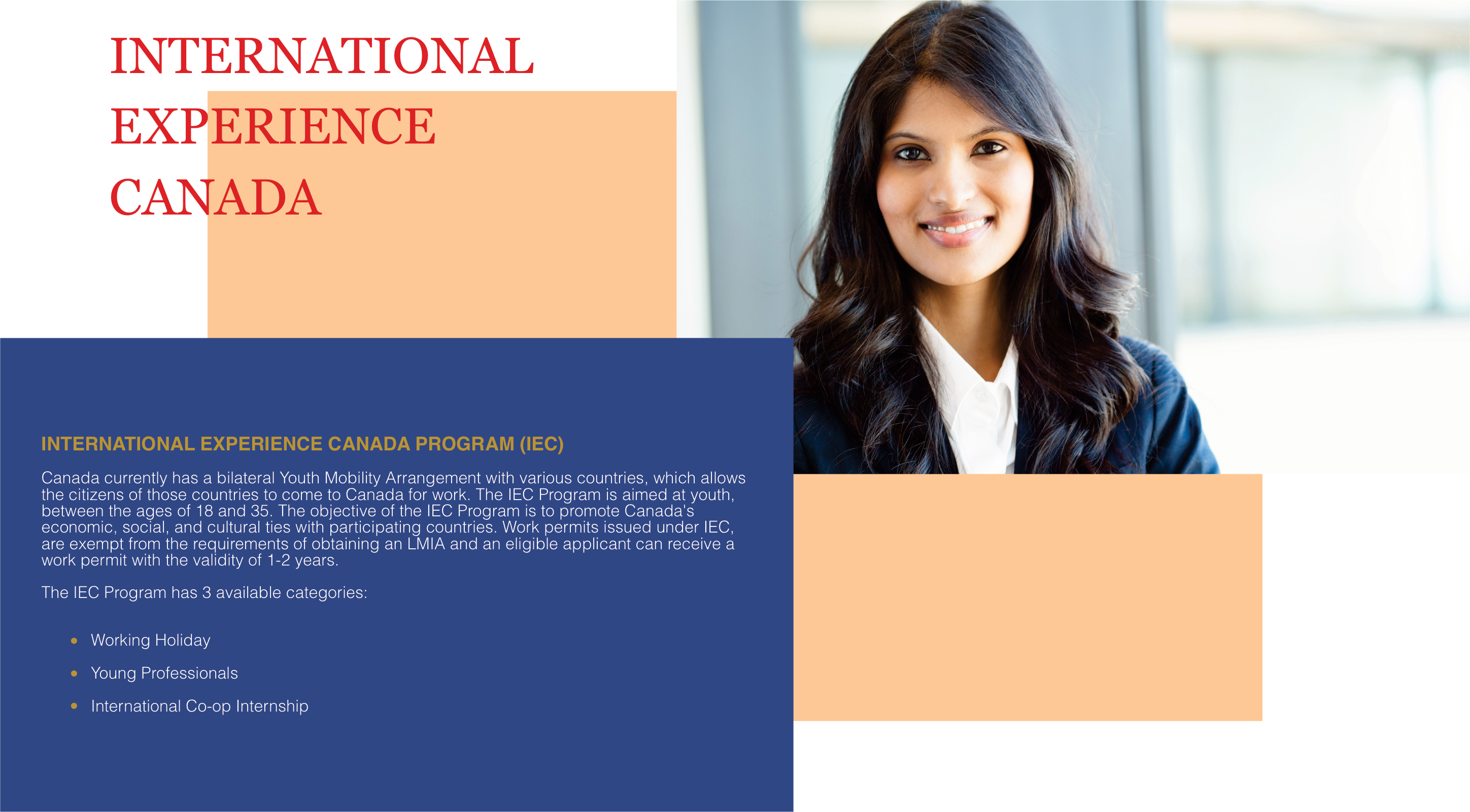
Working Holiday Category
The Working Holiday Visa is a temporary open work permit that can last between 12 and 24 months, depending on your home country. An open work permit will allow individuals to work with almost any employer in Canada. This is the most popular option for youth mobility, because participants are not required to have a job offer and it provides the flexibility to work for more than one employer, in any location in Canada.
Young Professionals Category
The (IEC) for young professionals allow youth to further their careers with professional work experience in Canada. This program allows youth to live and work in Canada for up to two years on a work permit. This is good opportunity for youth to gain valuable work experience in the country while preparing for their future. It can also connect youth with additional job opportunities in Canada that may broaden the area of expertise. If approved, applicants in this category would receive an employer specific work permit, which means you are required to work with this same employer during the duration of your stay in Canada.
In this category, you must have a valid job offer from a Canadian employer, that is classified as NOC skill type, level 0, A or B. The position offered, must be a paid position that would contribute to your professional career development. Your employer would be required to pay the $230.00 employer compliance fee through the Employer Portal.
International Co-Op Category
International Co-op Internship category is for students who are enrolled in post-secondary institution in their country of citizenship and who would like to gain work experience related to their field of studies, by interning for a Canadian Employer. If approved, applicants in this category would receive an employer specific work permit, which means you are required to work with this same employer during the duration of your stay in Canada.
In this category, you must have a valid job offer for a work placement or internship in Canada that is part of the requirements for the completion of your studies. The arrangements for this co-op placements with a Canadian employer must be made prior to applying under this category. Your employer would be required to pay the $230.00 employer compliance fee through the Employer Portal.
List of Countries with Bilateral Youth Mobility Agreements with Canada

Eligibility Requirements
Candidates wanting to apply under IEC, you must:
- be a citizen of one of the above-mentioned countries that have a bilateral Youth Mobility Arrangement with Canada
- have a valid passport for the duration of their stay in Canada, work permits issued will not be issued longer than the validity of your passport
- be between the ages of 18 and 35 at the time of application (some participating countries age limits are also between the ages of 18 and 30)
- have the equivalent of $2,500 CAD upon landing to help cover initial expenses for your travel
- be able to take out health insurance for the duration of their stay, which you may have to provide evidence of your purchased private health insurance
- be admissible to Canada
- have a pre-purchased round-trip ticket or proof of your financial ability to purchase a departure ticket for the end of their authorized stay
- not be accompanied by dependents
- be able to pay all the appropriate fees
If you are a citizen of the countries that has a bilateral youth mobility agreement with Canada and you would like to get some more information about the IEC program, contact our office.
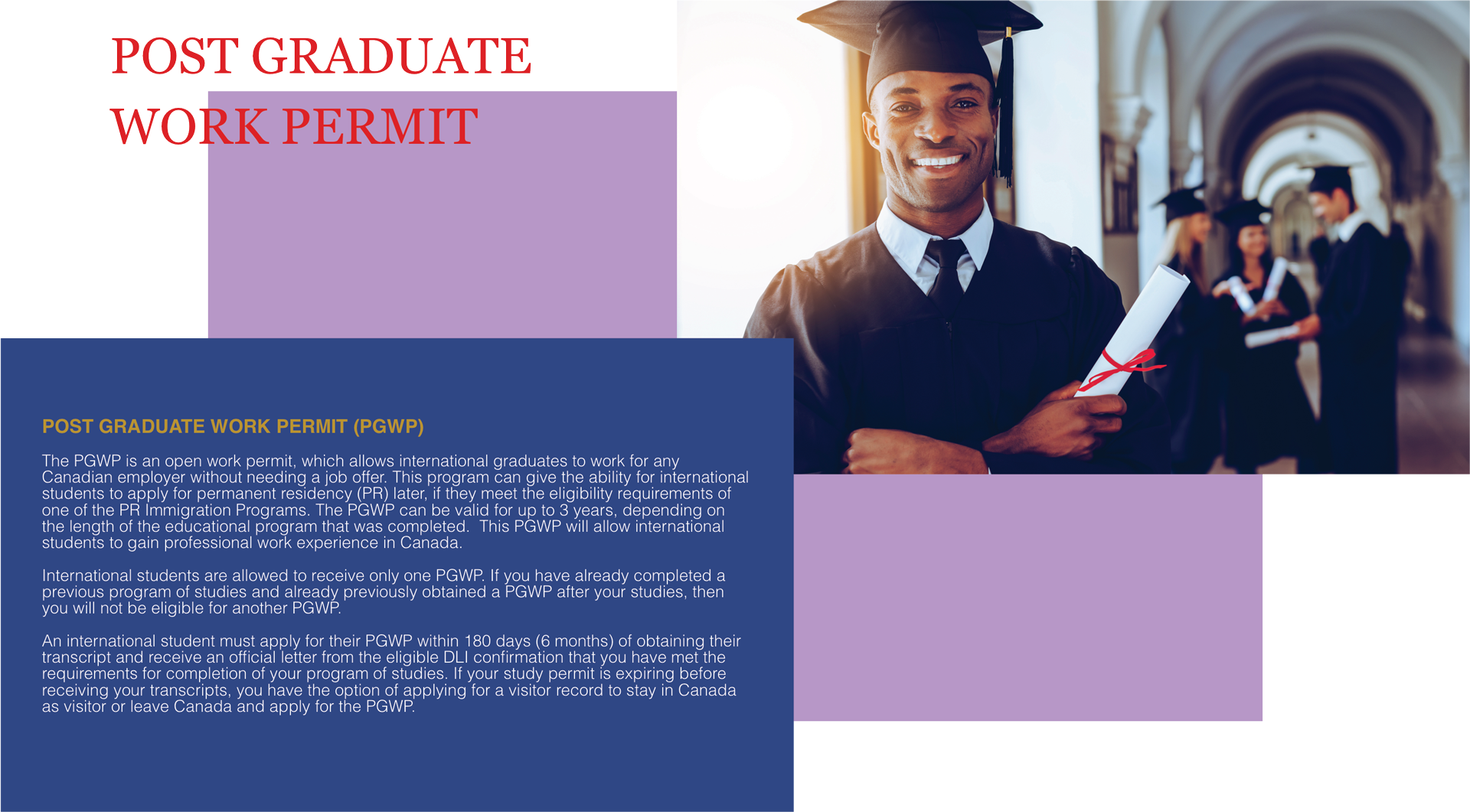
How long is a PGWP valid for?
The length an international student may receive on his or her PGWP, depends on the length of your study program completed:
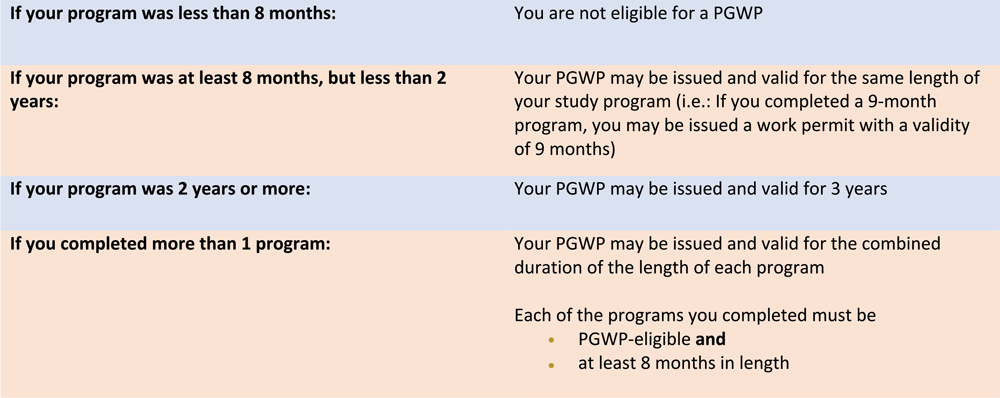
PGWP Eligibility Requirements
To be eligible for a PGWP:
- Your study permit has been valid within the last 180 days, or you have a valid visitor record
- You have applied to extend your study permit before it expired, and no decision has been made on your application
- You have applied to change your status to visitor before your study permit expired and no decision has been made on your application
- You have completed a study program
- at a designated learning institution
- that was at least 8 months long and
- that led to a degree, diploma or certificate
- You have maintained full-time status as a student in Canada during each semester of your study program
- This doesn’t include your final semester, which can be part-time, or if you took an approved leave from your studies.
- Note: Canada has waived this requirement during the coronavirus pandemic for certain international students. Exemptions may apply to those who have begun or will begin a program between spring 2020 and fall 2021, or those whose program was already in progress in March 2020. In addition, exceptions may apply for those who took a leave from their studies in their final academic session.
- You have graduated from one of the following:
- a public post-secondary school, such as a college, trade/technical school, university, or CEGEP (in Quebec)
- a private post-secondary school in Quebec that operates under the same rules as public schools in Quebec
- a private secondary or post-secondary school in Quebec that offers qualifying programs of 900 hours or longer that lead to a Diplôme d’études professionnelles (DEP—vocational studies diploma), or an Attestation de spécialisation professionnelle (ASP—vocational studies accreditation)
- An ASP can be less than 900 hours if combined with a DEP.
- a Canadian private school that can award degrees under provincial law (for example, Associate, Bachelor’s, Master’s, or PhD degree), but only if you’re enrolled in a study program that leads to a degree as authorized by the province.
Exceptions to the eligibility requirements
You aren’t eligible for a PGWP if you
- have a study permit that expired more than 180 days before you applied
- already received a PGWP
- studied English or French as a second language
- took general interest or self-improvement courses
- participated in the Government of Canada Awards Program funded by Global Affairs Canada
- had received funding from Global Affairs Canada
- Note: If you got a Study in Canada scholarship, you’re still eligible for a PGWP.
- got the Equal Opportunity Scholarship, Canada-Chile
- participated in the Canada-China Scholars’ Exchanges Program
- participated in the Organization of American States Fellowships Program
- completed the major part of a study program through distance learning (online courses, e-learning or correspondence)
- completed a study program at a non-Canadian institution located in Canada
CASE STUDY
James is an Indian citizen living in Kolkata, West Bengal, India who wanted to live and work as a chef in Canada. He holds multiple diplomas and certificates in culinary arts from various colleges and universities across India and has 12+ years of experience as a chef in India and Taiwan.
In April 2018, we applied for a Labour Market Impact Assessment for a well-known Indo-Chinese restaurant with locations in Surrey and Vancouver, BC to hire foreign worker. James applied directly for the job as a cook and was hired by the restaurant after a thorough selection process. We then supported James through a successful work permit application, advising him on what documents to collect, and answering all his questions. In the end, he only had to wait 6 months to start his new culinary career in Canada.
